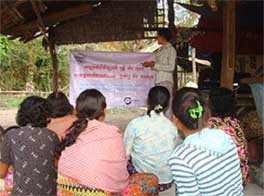 Photo credit: Rural Development Association: A volunteer (Eng Mara) with RDA trains women on the use of mobile phones to prevent VAW. Picture by: RDA staff Date: 18 January 2011
Photo credit: Rural Development Association: A volunteer (Eng Mara) with RDA trains women on the use of mobile phones to prevent VAW. Picture by: RDA staff Date: 18 January 2011
Violence against women – in particular domestic violence – and children is under-reported in Cambodia, despite it being a growing and prevalent social issue that affects whole communities. All forms of violence against women (VAW) usually take place under a veil of silence and shame due to the fear of stigmatisation and a strong sense of obligation to keep family reputations intact. Traditional gender relations hold women at a lower status than men, and violence is a socially acceptable way to resolve domestic conflicts.
Breaking the silence in 25 villages
However the Rural Development Association (RDA), a grassroots non-profit organisation in western Cambodia is working in 25 villages to break the silences that keep VAW a family secret and to make it a community issue, to educate residents about VAW and to mobilise community support to report VAW using mobile phone technology. Though work only started in November 2010 after RDA was awarded an MDG3 Fund small grant from APC women’s network support programme (WNSP) as part of the MDG3: Take Back the Tech! to stop violence against women project, it already has made a tremendous impact on the lives of the women and children in the participating villages, as well as the community as a whole.
Community training on mobile phones to stop VAW
RDA held workshops with local women and girls on how they can use mobile phones and Icom (portable ham radios) to report incidences of violence and domestic abuse to their local police officers and village leaders, so they can receive help. As well RDA trained local village leaders, community members and police officers on how mobile phones can be used for them to intervene when a woman or family member calls to report that domestic violence is taking place.
Now there is a system for women to report abuse and to get help. Each household has the phone number of the local policeman. When a woman experiences violence, she or someone else in the household calls a village volunteer, neighbor or relative who then calls the local policeman who intervenes. The abuser is brought to the local police station where he must pay a fine and sign a contract agreeing to stop his violent behaviour.
Villagers now understand that VAW is against the law and must be stopped
Chan Sinath, the executive director of RDA, says the abusers – most often husbands – are reportedly “more gentle” when they return home. When a man comes home after a visit to the police station “he reduces violence towards his wife” and is more prone to “listen and to respect the ideas of his wife,” she said.
As a result, the self-esteem of women survivors of violence is beginning to grow, Chan Sinath confirmed. They are starting to make decisions in their families and join in activities with other women in the villages, which they didn’t do before because they were afraid of their husbands, she said.
Children are benefiting from calmer and more respectful family environments. Before, they would attend to their mother after a violent attack by their father, preventing them from going to school, Chan Sinath said. Now they are able to go to school regularly and focus on their studies.
Relationships between neighbours, family members and village leaders have also strengthened as the community has rallied to report domestic abuse and end violence against women in their villages, she said.
Community members now understand that VAW is against the law and must be stopped. It is no longer a private problem to keep hidden; it is a social issue with rippling consequences throughout families and communities.
Small grants support other innovative uses of mobiles to raise awareness and end violence
Mobile phones are increasingly being used by advocacy organisations and women’s rights activists across Asia and Africa as an effective medium to send information and raise awareness about VAW, and for advocacy – especially in areas where internet access is limited.
The groups below all received MDG3 Fund small grants from APC WNSP to support projects where mobile phone technologies are used to fight VAW.
In Uganda, the Uganda Media Women’s Association counsels women who have survived domestic violence and sends information to them via mobile phones about gender-based violence. This project is allowing survivors of violence access to information about the causes of VAW they may not have had access to before.
In South Africa, Justice and Women has set up a monitoring and response system using a mobile phone-based bulk messaging tool in three rural areas. This project is allowing women better access to information and service delivery for victims of gender-based violence and sexual assault.
The non-profit organisation Uwaki Sud Kivu in the Democratic Republic of Congo is training approximately 600 girls how to use mobile phone applications such as FrontlineSMS and Freedom Fone to report violence.
Similarly, Isis WICCE in Uganda is teaching women living with HIV/AIDS how to use FrontlineSMS and other mobile applications for advocacy to end VAW.
In the Republic of Congo, two organisations – Association Dynamique Plurielle and Comptoir Juridique Junior are working in high schools to train students how to send SMS alerts about sexual harassment cases to school officials who then respond.
The Center for Migrant Advocacy Inc. in the Philipines has created an SMS helpline that provides emergency assistance and support for migrant workers – especially Filipina migrant domestic workers vulnerable to violence – by linking them to the appropriate government agencies and embassies.